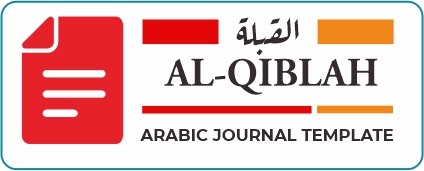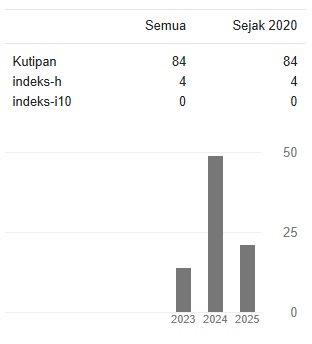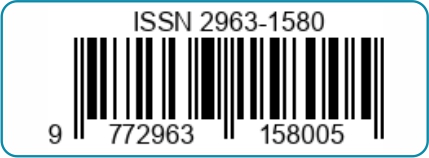Implikasi Kategori Ibadah Mahda dan Ibadah Gairu Mahda pada Penetapan Hukum dalam Kitab Taharah Bidāyah al-Mujtahid wa Nihāyah al-Muqtaṣid
Implications of the Categories of Mahda Worship and Gairu Mahda Worship on the Determination of Laws in the Book of Taharah Bidāyah al-Mujtahid wa Nihāyah al-Muqtaṣid
DOI:
https://doi.org/10.36701/qiblah.v4i3.2324Keywords:
Mahdhah Worship, Ghairu Mahdhah Worship, Determination of Law, Thaharah Book, Bidāyah al-Mujtahid wa Nihāyah al-MuqtaṣidAbstract
This study aims to understand and analyze the legal implications between mahda worship and gairu mahda worship in the book of taharah Bidāyah al-Mujtahid wa Nihāyah al-Muqtaṣid. The problems that the researcher raises in this study are: first, how is the construction of the division of worship into mahda and gairu mahda; second, what is the urgency of categorizing worship into mahda and gairu mahda; third, what are the implications of categorizing worship into mahda and gairu mahda on the determination of law in the book of taharah Bidāyah al-Mujtahid wa Nihāyah al-Muqtaṣid. The type of research used in this study is library research. The approach methods used are Islamic law approach, textual approach, and comparative approach. The research findings are: first, worship based on its type is divided into two, mahda worship, namely worship whose 'illah is unknown and gairu mahda worship, namely worship whose 'illah is known. Second, with the categorization of worship as mahda and gairu mahda, a mujtahid is able to distinguish which laws can be likened because its 'illah is known and which cannot be likened because its 'illah is unknown. Third, the categorization of mahda and gairu mahda worship has implications for the book of taharah Bidāyah al-Mujtahid wa Nihāyah al-Muqtaṣid in several issues; ablution and bathing after janabah, washing hands before putting them into a vessel, wiping the head more than once, rukhsah wiping the khuf, and tayammum. The implications of this research include being able to help in determining the correct laws and practices of worship in daily life, especially in the issue of taharah. In addition, by understanding the reasons for the differences among scholars which are rooted in the different categorizations of mahda and gairu mahda worship, Muslims can be more aware in responding to differences of opinion.
Downloads
References
Al-Qur’ān al-Karīm.
Adinugraha, Hendri Hermawan, & Ahmad Hasan Asy’aro Ulama’i. “Memahami Studi Islam dengan Pendekatan Tekstual dan Kontekstual.” Jurnal Pemikiran Konstruktif Bidang Filsafat dan Dakwah 17, no. 1 (Juni 2020): 30.
Aditya, Dodiet. “Data dan Metode Pengumpulan Data.” Laporan Penelitian. Makassar: UIN Alauddin, 2021.
Akbar, Khaerul, et al. Pedoman Penulisan Karya Tulis Ilmiah (KTI) STIBA Makassar. Makassar: Pusat Penelitian & Pengabdian Masyarakat STIBA Makassar, 2023.
al Bagdādī, Abū al Ḥasan ‘Alī b. Muḥammad. Al Ḥāwī al Kabīr fī Fiqh Madhhab al Imām al Shāfi‘ī, Juz 1. Cet. I. Beirut: Dār al Kutub al ‘Ilmiyyah, 1419 H/1999 M.
al Baeḥāqī, Abū Bakr Aḥmad b. al Ḥusayn. Al Sunan al Kubrā, Juz 1. Cet. III. Beirut: Dār al Kutub al ‘Ilmiyyah, 1424 H/2003 M.
al Bukhārī, Abū ʿAbdillāh Muḥammad ibn Ismāʿīl. Ṣaḥīḥ al Bukhārī, Juz 1. Cet. V. Dimasq: Dār al Yamāmah, 1414 H/1993 M.
al Dimashqī, Abū Muḥammad ʿIzzuddīn ʿAbd al ʿAzīz. Qawāʿid al Aḥkām fī Maṣāliḥ al Anām, Juz 1. Cet. I. Al Qāhirah: Maktabat al Kulliyāt al Azhariyyah, 1414 H/1991 M.
al Dimashqī, Taqī al Dīn Abū al ʿAbbās Aḥmad. Al ʿUbūdīyah. Cet. VII. Beirut: al Maktab al Islāmī, 1426 H/2005 M.
———. Qāʿidah fī al Muḥabbah. Al Qāhirah: Maktabah al Turāṡ al Islāmī, t.t.
al Ḥanafī, Abū Bakr ibn ‘Alī ibn Muḥammad al Ḥaddādī al ʿAbbādī al Zabīdī al Yamanī. Al Jauharah al Nayyirah, Juz 1. Cet. I. t.t.: Al Maṭbaʿah al Khairīyah, 1332 H.
al Hanbalī, Mansūr ibn Yūnus al Bahūtī. Kasyāf al Qināʿ ‘an al Iqnā‘, Juz 1. Cet. I. Riyāḍ: Wizārat al ‘Adl, 1421 H/2000 M.
al Ibn Taymiyyah, Aḥmad ibn ʿAbdul Ḥalīm. Minhāj al Sunnah al Nabawiyyah fī Naqd Kalām al Shīʿah al Qadariyyah, Juz 1. Cet. I. Riyāḍ: Jāmiʿah al Imām Muḥammad ibn Saʿūd al Islāmiyyah, 1414 H/1991 M.
al Jawzīyyah, Abū ‘Abdullāh Muḥammad ibn Abī Bakr. Badāʾiʿ al Ṣanāʾiʿ fī Tartīb al Sharāʾiʿ, Juz 1. (Cetakan & penerbit belum lengkap).
al Kirmānī, Abū Muḥammad Ḥarb ibn Ismāʿīl. Masā’il Ḥarb ibn Ismāʿīl al Kirmānī, Juz 1. Cet. I. Mu’assasah al Rayyān, 1434 H/2013 M.
al Magribī, Syams al Dīn Abū ʿAbdillāh Muḥammad. Mawāhib al Jalīl fī Syarḥ Mukhtaṣar Khalīl, Juz 1. Cet. III. t.t.: Dār al Fikr, 1412 H/1992 M.
al Mālikī, Abū al Ḥasan ‘Alī ibn ‘Umar ibn Aḥmad al Baghdadī. ʿUyūn al Adillah fī Masā’il al Khilāf bayna Fuqahā’ al Amṣār, Juz 2. t.t.: t.p., 1426 H/2006 M.
al Mālikī, Abū Muhammad ibn Aḥmad ibn Arafah ad Dasūqī. Ḥāshiyat ad Dasūqī ʿalā ash Sharḥ al Kabīr, Juz 1. t.d.
al Mursī, Abū al Ḥasan ʿAlī ibn Ismāʿīl. Al Mukhaṣṣaṣ, Juz 4. Cet. I. Beirut: Dār Iḥyāʾ al Turāth al ‘Arabī, 1417 H/1996 M.
al Nāṣirī, Abū al Ḥusain Muslim ibn al Ḥajjāj. Ṣaḥīḥ Muslim, Juz 1. Turkiyyah: Dār al Ṭibāʿah al ‘Āmirah, 1334 H/1915 M; Beirut: Dār Iḥyā’ al Turāth al ‘Arabī, 1374 H/1955 M.
al Qazwīnī, Ibn Mājah Abū ʿAbdillāh Muḥammad ibn Yazīd. Sunan Ibn Mājah, Juz 1. t.t.: Dār Iḥyāʾ al Kutub al ‘Arabiyyah.
al Qurṭubī, Abu al Walīd Muḥammad ibn Aḥmad ibn Muḥammad ibn Aḥmad ibn Rusyd. Bidāyah al Mujtahid wa Nihāyah al Muqtaṣid, Juz 1. Cairo: Dār al Ḥadīth, 1425 H/2004 M.
al Samarqandī, ‘Alāʾ ad Dīn. Tuḥfah al Fuqahāʾ, Juz 1. Cet. II. Beirut: Dār al Kutub al ‘Ilmiyyah, 1414 H/1994 M.
al Sarakhsī, Abū Bakr Muḥammad ibn Aḥmad ibn Abī Sahl. Uṣūl al Sarakhsī, Juz 2. Beirut: Lajnah Iḥyāʾ al Ma’ārif al Nu’māniyyah, t.h.
al Sijistānī, Abū Dāwūd Sulaimān ibn al Asyʿaṡ. Sunan Abī Dāwūd, Juz 1. Beirut: Al Maktabah al ʿAṣriyyah, t.th.
al Syāṭibī, Abū Isḥāq Ibrāhīm ibn Mūsā. Al Muwāfaqāt, Juz 3. Dār Ibn ‘Affān, 1417 H/1997 M.
al Ṭabarī, Abū Jaʿfar Muḥammad ibn Jarīr. Tafsīr al Ṭabarī, Juz 1. Dār Hajar, 1422 H/2001 M.
al Ṭaḥāwī, Abū Jaʿfar Aḥmad ibn Muḥammad. Syarḥ Maʿānī al Āthār, Juz 1. t.p.: ‘Ālam al Kutub, 1414 H/1994 M.
al ʿUṡaimīn, Muḥammad ibn Ṣāliḥ. Majmūʿ Fatāwā wa Risāʾil Faḍīlah, Juz 1. Dār al Waṭan, 1413 H/1992 M.
al Wāʾilī, Muḥammad ibn Ḥamūd. Bughyah al Muqtaṣid Syarḥ Bidāyah al Mujtahid li Ibn Rusyd al Ḥafīd, Juz 1. Cet. I. Beirut: Dār Ibn Ḥazm, 1440 H/2019 M.
al Yamanī, Muḥammad ibn ‘Alī ibn Muḥammad ibn ‘Abdullāh al Syaukānī. Fatḥ al Qadīr, Juz 1. Beirut: Dār Ibn Kaṡīr, 1414 H.
al Zabīdī, Muḥammad Murtaḍā al Ḥusaynī. Tāj al ʿArūs min Jawāhir al Qāmūs, Juz 8. t.t.: Dār al Hidāyah, 1385 H/1965 M.
al Zarkashī, Abu ‘Abdullāh Badr al Dīn Muḥammad ibn ‘Abdullāh. Al Baḥr al Muhīt fī Uṣūl al Fiqh, Juz 5. Cet. I. Cairo: Dār al Kutub, 1414 H/1994 M.
al Zuḥailī, Wahbah ibn Muṣṭafā. Al Fiqh al Islāmī wa Adillatuh, Juz 1. Cet. XII. Dimasyq: Dār al Fikr, t.t.h.
Amal, Naiul. “Klasifikasi Ibadah Mahdhah dan Ibadah Gairu Mahdhah dalam Islam Menurut Perspektif Ibnu Rusyd dan Abu Bakar Syatha.” Skripsi, Fakultas Syariah & Hukum, Universitas di Banda Aceh, 2022.
Anam, Masrul. “Pendekatan Fikih dan Pengaruh Mazhab dalam Kajian Tafsir Al Qur’an.” Al ‘Ijaz 3, no. 1 (Juni 2021): 31–45.
Bakar, Rifa’i Abu. Pengantar Metodologi Penelitian. Cet. I. Yogyakarta: SUKA press, 2021.
Kementerian Agama Republik Indonesia. Al Qur’an dan Terjemahnya. Jakarta: Lajnah Pentashihan Mushaf Al Qur’an, 2019.
Swaisi, Syifa. “Aḥkām al Sharʿiyyah baina al Taʿabbud wa al Ta‘līl.” Tesis, Université Echahid Hamma Lakhdar, El Oued, t.t.
Tilout, Jamilah. “Al ‘Ibādah baina al Ta‘līl wa al Ta‘abbud: Muqārabah al Uṣūliyyah.” Laporan Penelitian, 2011.



 FOCUS AND SCOPE
FOCUS AND SCOPE EDITORIAL TEAM
EDITORIAL TEAM












